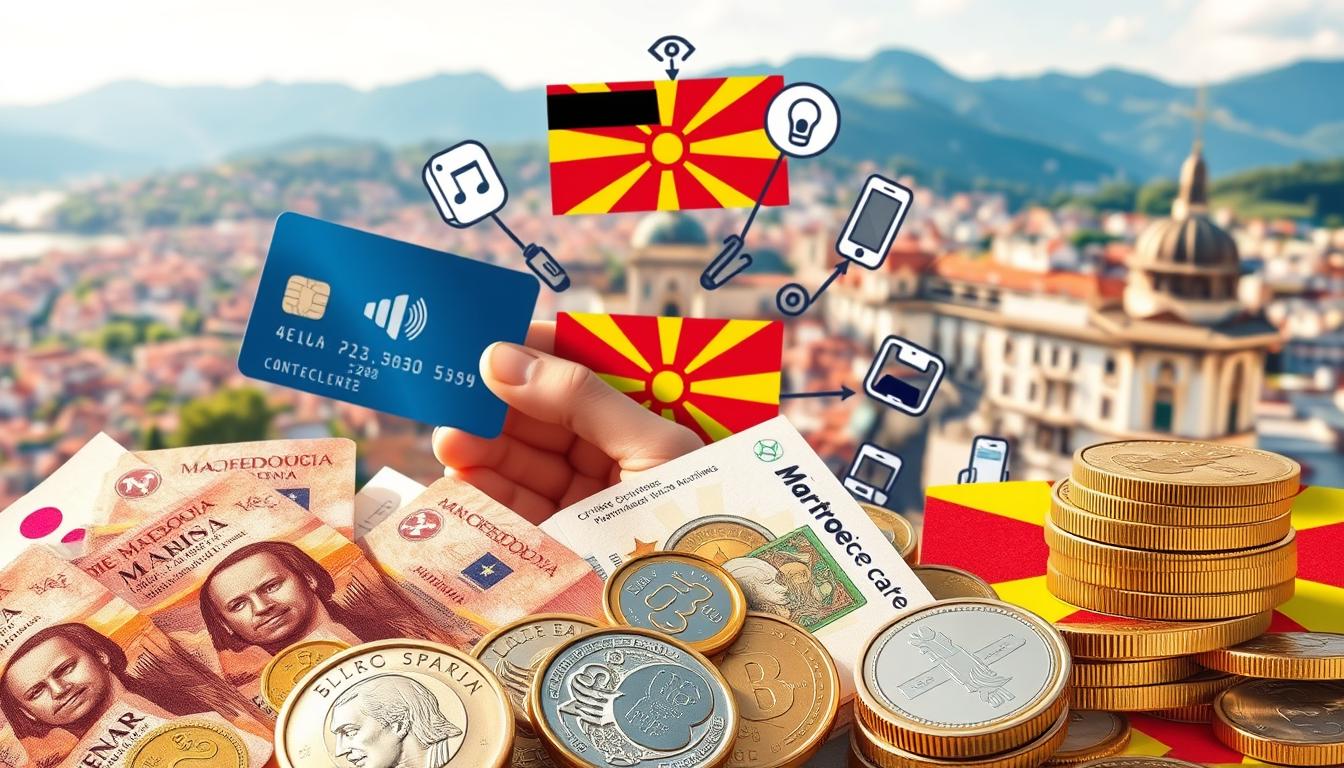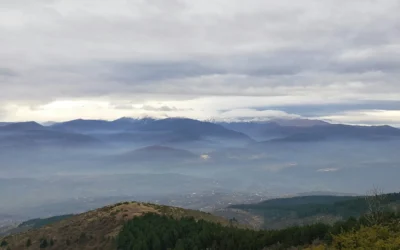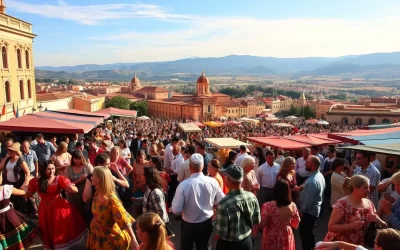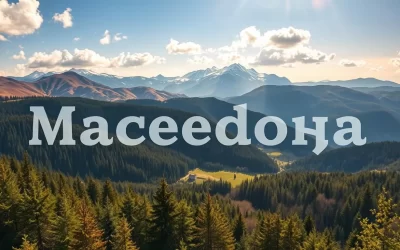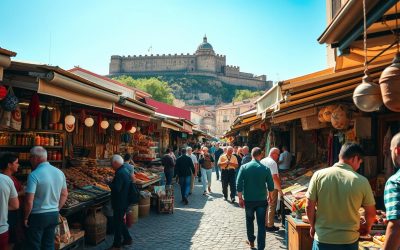✓ Accommodations ✓ Flights ✓ Rental Cars ✓ Tours & Activities
Did you know that using the local currency in North Macedonia can save you up to 10% compared to exchanging Euros at the airport? This small Balkan gem, known for its ancient history and stunning landscapes, offers a unique blend of modern and traditional payment methods. Understanding the Macedonian Denar (MKD) is key to making the most of your trip.
From bustling markets to serene monasteries, cash remains king in many places, especially outside urban centers. However, card payments are widely accepted in hotels and restaurants. Paying in MKD not only helps you avoid extra fees but also ensures smoother transactions.
This guide will walk you through everything you need to know about handling money in North Macedonia. Whether it’s finding the best ATMs, exchanging currency, or staying safe with cash, we’ve got you covered. Let’s dive in and make your travel experience seamless and stress-free!
Understanding the Currency Landscape in North Macedonia
The Macedonian Denar, the official currency, holds a fascinating history tied to ancient Roman coinage. Named after the Roman ‘denarius,’ the Denar is more than just money—it’s a symbol of the country’s rich cultural and monetary heritage. Understanding this currency is essential for navigating local markets and ensuring smooth transactions during your trip.
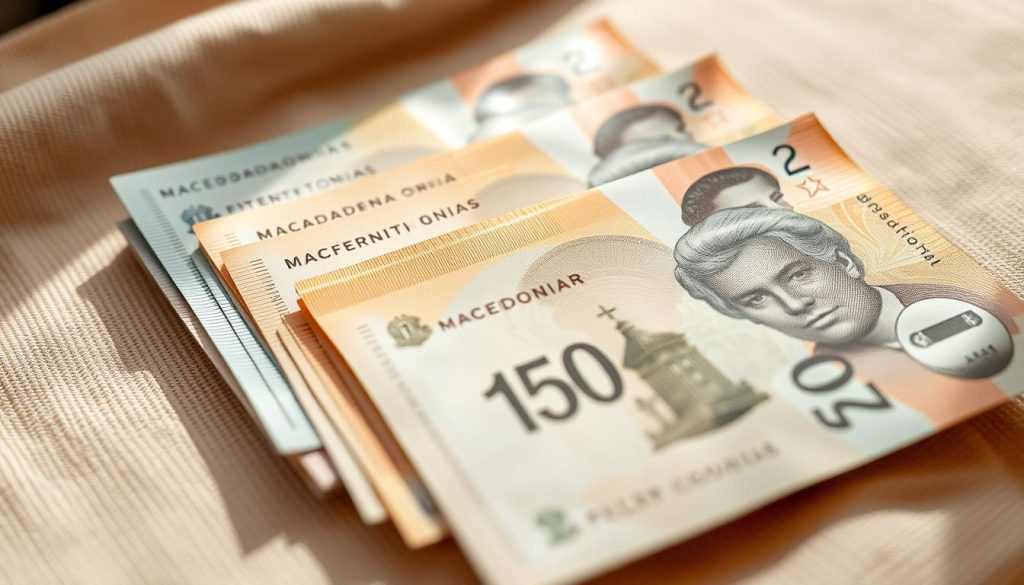
Introduction to the Macedonian Denar
The Denar (MKD) is the backbone of North Macedonia’s economy. It’s a closed currency, meaning it cannot be exchanged outside the country. This makes it crucial to handle your money wisely while traveling. Paying in MKD not only helps you avoid extra fees but also connects you to the local way of life.
Currency Denominations and Historical Roots
The Denar’s denominations reflect its blend of tradition and modernity. Here’s a breakdown of the bills and coins you’ll encounter:
| Denomination | Type | Approx. Value in EUR |
|---|---|---|
| 10 MKD | Coin | €0.16 |
| 50 MKD | Coin | €0.81 |
| 100 MKD | Bill | €1.62 |
| 1000 MKD | Bill | €16.20 |
| 5000 MKD | Bill | €81.00 |
These denominations are widely used in everyday transactions, from small purchases at local markets to larger expenses at hotels. Familiarizing yourself with them before your trip ensures you’re prepared for any situation.
The Denar’s historical roots date back to the Roman Empire, where the ‘denarius’ was a standard coin. This legacy is a testament to the country’s enduring connection to its past. By using the Denar, you’re not just handling money—you’re engaging with a piece of history.
Essential Money Matters: Currency and Payment Overview
Managing your money wisely in North Macedonia starts with understanding the local currency and payment options. Whether you’re exploring bustling cities or remote villages, knowing how to handle the Macedonian Denar (MKD) is key to a stress-free trip.
Why Using MKD is the Best Option
Paying in the local currency ensures you get the best value. Using MKD helps you avoid extra fees often charged for foreign currency transactions. Exchange rates are also more favorable when you stick with the local money.
For example, converting Euros or USD to MKD at the airport or uncompetitive exchange bureaus can cost you more. Using MKD directly from ATMs or through reputable exchanges saves you money and simplifies your transactions.
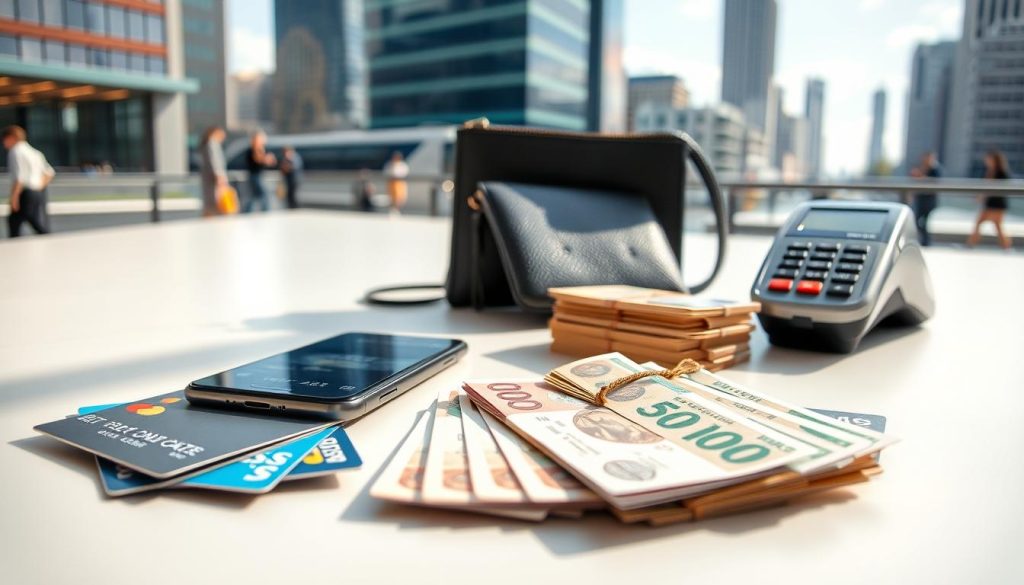
Comparing Cash and Card Usage
Both cash and cards have their place in North Macedonia. Here’s a quick comparison to help you decide:
- Cash: Essential for local markets, taxis, and small businesses. It’s widely accepted, especially in rural areas.
- Cards: Convenient for hotels, restaurants, and larger stores. Many places accept Visa and Mastercard, but always carry some cash as a backup.
ATMs are widely available, but check with your bank about withdrawal fees. Some cards charge foreign transaction fees, which can add up. Using a multi-currency card can help you save on these costs.
By understanding these differences, you can optimize your spending and make the most of your trip.
How to Get Money in North Macedonia: ATMs, Exchanges & Transfers
Accessing money during your trip can be hassle-free with the right strategies. Whether you’re withdrawing cash, exchanging currency, or using transfers, knowing your options ensures you’re always prepared.
Accessing ATMs and Debit Card Options
ATMs are widely available in cities, tourist areas, and even at the airport. Using your card at a local ATM is one of the easiest ways to get MKD. Look for ATMs operated by well-known banks like Stopanska or Halk Bank, as they often offer better rates and lower fees.
International debit and credit cards, especially Visa and Mastercard, work seamlessly in most ATMs. However, check with your bank about foreign transaction fees. Using a multi-currency card can help you save on these costs.
Always prioritize ATMs in secure locations, such as inside banks or busy areas. Avoid carrying large amounts of cash and withdraw only what you need for the day.
Currency Exchange at Banks and Licensed Bureaus
If you prefer exchanging currency, licensed exchange bureaus, known as “Menjačnica,” are your best bet. They typically offer better rates than those at the airport or hotels. Banks also provide reliable exchange services, though they may have limited operating hours.
Here’s a quick tip: exchange only a small amount at the airport for immediate expenses. Wait until you reach the city to access better rates. This simple step can save you money and ensure you get the most out of your MKD.
For added convenience, consider using transfer services that allow local pick-up. This option is ideal if you’re traveling with limited cash or need a secure way to access funds.
By following these tips, you can handle your money efficiently and focus on enjoying your time in this beautiful country.
Exploring Payment Options Across the Country
Navigating payment methods in North Macedonia is easier when you know where to use cash or cards. From bustling markets to modern hotels, understanding the local preferences ensures smooth transactions and a stress-free experience.
Cash-Based Transactions in Local Markets and Taxis
In many places, especially local markets and taxis, cash is the preferred payment method. Small businesses and street vendors often rely on cash due to lower transaction fees and simplicity. For example, buying fresh produce at a bazaar or paying for a taxi ride typically requires MKD in hand.
Carrying cash is particularly useful in rural areas, where card acceptance is limited. It’s a good idea to keep smaller denominations for everyday purchases. This way, you’re prepared for any situation, whether it’s a quick snack or a handmade souvenir.
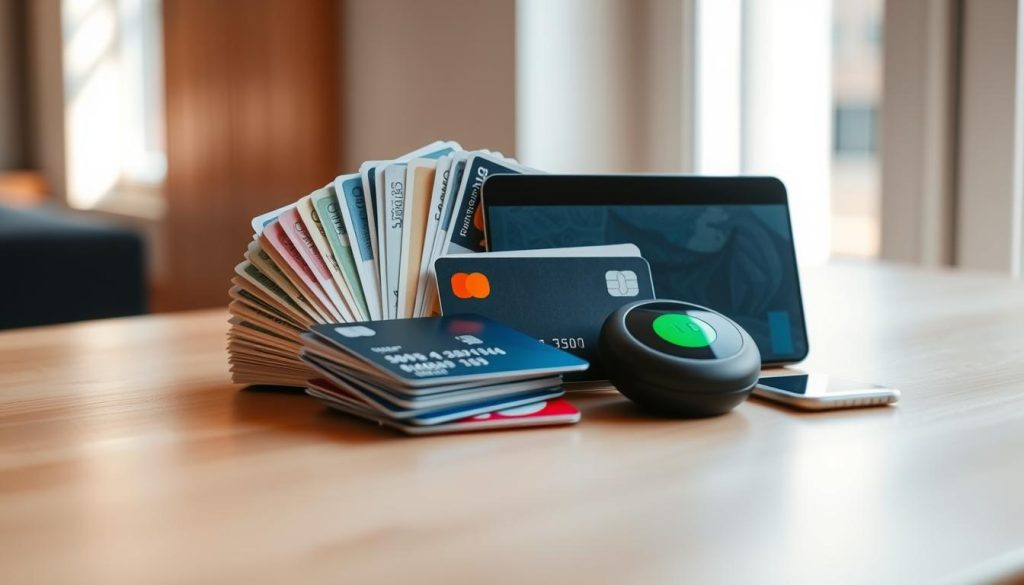
Acceptance of Credit/Debit Cards in Hotels and Retail Stores
In urban centers, card payments are widely accepted. Hotels, restaurants, and retail stores often welcome major cards like Visa and Mastercard. This convenience makes it easy to manage your money without carrying large amounts of cash.
For instance, dining at a modern restaurant or shopping at a well-known store usually allows you to pay with a card. However, it’s always wise to carry a small amount of cash as a backup, especially in smaller establishments.
| Payment Method | Best For | Tips |
|---|---|---|
| Cash | Local markets, taxis, rural areas | Carry smaller denominations for convenience |
| Card | Hotels, restaurants, retail stores | Check for foreign transaction fees |
Knowing these options helps you plan your payment strategy effectively. Whether you’re exploring a vibrant city or a quiet village, being prepared ensures you can focus on enjoying your trip.
North Macedonia: Ultimate Travelers Guide to Currencies & Payments
Smart currency exchange strategies can make your trip more budget-friendly. By understanding how to handle your money, you can avoid unnecessary fees and get the best value for your exchange.
Optimizing Currency Exchange Strategies
Paying in the local currency, MKD, ensures you get the best rates. Avoid exchanging money at the airport, as rates are often less favorable. Instead, visit banks or licensed exchange bureaus for better deals.
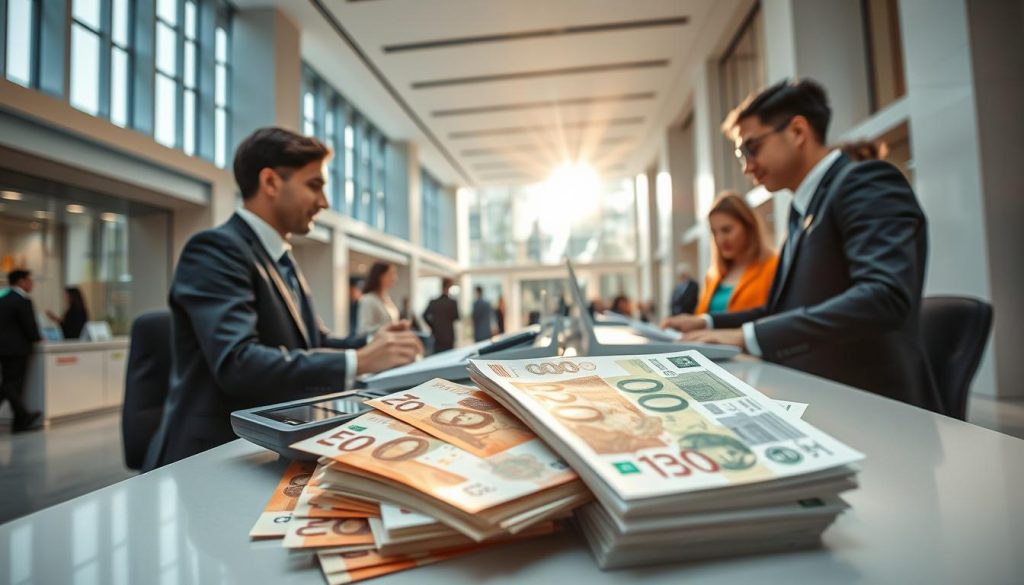
Using apps like ATM Fee Saver can help you locate ATMs with low withdrawal fees. Planning ahead for your currency needs also helps you manage costs effectively. Compare rates across multiple providers to spot the best deals.
Avoiding Unnecessary Fees and Poor Exchange Rates
Extra fees on card swipes and ATM withdrawals can add up quickly. Always check with your bank about foreign transaction fees. Using a multi-currency card can save you money on these charges.
When shopping at local markets or small stores, cash is often preferred. Carrying smaller denominations of MKD ensures you’re prepared for any situation. By following these tips, you can significantly reduce your overall travel costs.
Practical Tips for Managing Your Money While Traveling
Handling your money efficiently while traveling can make your journey smoother and more enjoyable. Whether you’re exploring bustling cities or quiet villages, these practical tips will help you stay safe and manage your finances effectively.
Keeping Cash Safe and Secure
Carrying cash is essential, especially in areas where cards aren’t widely accepted. To keep your money safe, consider using a money belt or a zippered bag. These items are discreet and reduce the risk of theft in crowded places.
Only withdraw the cash you need for the day. This minimizes loss if something happens. Avoid counting money in public or using ATMs at night. Instead, use ATMs located inside banks or hotels for added security.
How to Balance Cash and Card Payments
Balancing cash and card payments is key to managing your money wisely. Use cards for larger purchases at hotels, restaurants, and retail stores. This reduces the need to carry large amounts of cash.
For smaller transactions, like local markets or taxis, cash is often the preferred method. Carry smaller denominations to make payments easier. Here’s a quick comparison to help you decide:
| Payment Method | Best For | Tips |
|---|---|---|
| Cash | Local markets, taxis, rural areas | Carry smaller denominations for convenience |
| Card | Hotels, restaurants, retail stores | Check for foreign transaction fees |
By following these tips, you can manage your money effectively and focus on enjoying your trip.
Planning Your Trip Budget and Expenditure in North Macedonia
Planning your trip budget in North Macedonia can make your journey more enjoyable and stress-free. Knowing how much to spend daily and understanding local tipping practices ensures you’re prepared for every situation. Whether you’re dining at a restaurant, taking a taxi, or exploring local services, a clear spending plan helps you stay on track.
Budgeting for Daily Expenses and Tipping Etiquette
Start by estimating your daily costs. A typical day might include meals, transportation, and small purchases. For example, a meal at a local restaurant can range from $2 to $10, while a taxi ride within the city costs around $5.
Tipping is appreciated but not mandatory. In restaurants, rounding up the bill or leaving 5-10% is common. For taxi drivers, a small tip is a nice gesture. Always carry small denominations of MKD for convenience.
Cost Considerations for Restaurants, Taxis, and Local Services
Here’s a breakdown of typical expenses to help you plan your budget:
| Expense | Average Cost |
|---|---|
| Meal at a local restaurant | $2 – $10 |
| Taxi ride (city center) | $5 |
| Museum entrance fee | $2 – $5 |
| Local bus fare | $1 – $2 |
Tracking your expenses with apps like Trail Wallet or Splitwise can help you stay within your budget. These tools allow you to monitor spending and adjust your plan as needed.
By creating a realistic budget and sticking to it, you can enjoy your trip without worrying about overspending. Remember, a little planning goes a long way in making your journey smooth and memorable.
Understanding Exchange Rates and Payment Fees
Exchange rates and fees can significantly impact your travel budget, so understanding them is essential. Knowing how to navigate these costs ensures you get the best value for your money. Whether you’re withdrawing cash or using a card, being informed helps you avoid unnecessary expenses.
Navigating Bank and ATM Withdrawal Charges
When using ATMs, fees can add up quickly. Many banks charge withdrawal fees, especially for international transactions. For example, some ATMs may charge a flat fee per withdrawal, while others add a percentage of the total amount.
To minimize costs, choose ATMs operated by major banks or use a card with low foreign transaction fees. Apps like ATM Fee Saver can help you locate ATMs with lower charges. Always check your bank’s policies before traveling to avoid surprises.
Using Apps and Tools for Live Rate Monitoring
Exchange rates fluctuate throughout the day due to market conditions. Monitoring live rates ensures you exchange money at the best possible rate. Apps like XE Currency and Revolut provide real-time updates, helping you make informed decisions.
Timing your transactions can also save you money. For instance, exchanging money during peak market hours often yields better rates. Avoid exchanging currency at airports or tourist hotspots, as they typically offer less favorable rates.
Here are some tips to optimize your exchange strategy:
- Use apps to track live rates and compare providers.
- Plan your withdrawals to minimize fees.
- Choose reputable banks or licensed bureaus for currency exchanges.
By understanding these rates and fees, you can manage your money more effectively. This knowledge not only saves you money but also ensures a smoother travel experience.
Conclusion
Exploring the financial landscape of this Balkan country can make your trip smoother and more enjoyable. Using the local currency, MKD, ensures you get the best value and avoid unnecessary fees. Whether you’re withdrawing cash or exchanging money, choosing the right option saves you time and money.
Balancing cash and card payments is essential. While cards are convenient for hotels and restaurants, cash is often preferred in local markets and rural areas. Planning your finances ahead of time, including setting a budget and knowing tipping customs, helps you stay on track.
By following this guide, you can manage your money wisely and focus on enjoying your travel experience. Preparing for your trip’s financial needs not only saves you money but also enhances your overall journey. With the right plan, you’re ready to explore this beautiful country with confidence.
The above is subject to change.
Check back often to TRAVEL.COM for the latest travel tips and deals.
Here are some Tours & Sightseeing suggestions that might pique your interests!
